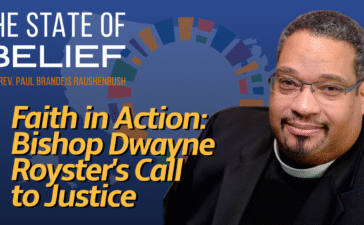(RNS) — When I heard the new Holy Father had taken the name Leo XIV, following Pope Leo XIII, who reigned as the Industrial Revolution was fundamentally altering 19th-century Western society, I wondered: Is he signaling that his pontificate will address ways technology is changing our culture?
Cardinal Chomalí, who had dinner with the pope soon after his election, said he asked Leo why he had chosen the name. Leo answered that he is “very concerned about the cultural shifts we are living through, a Copernican revolution really — artificial intelligence, robotics, human relationships.” He said he was “inspired by Leo XIII, who in the midst of the Industrial Revolution wrote ‘Rerum Novarum,’ launching an important dialogue between the church and the modern world.”
The pope added, according to Chomalí, “There is a revolution happening, and it must be addressed seriously. The church can contribute through its moral authority and also its academic strength.”
In his Saturday address to the College of Cardinals, Leo confirmed this central concern, saying that his main reason for picking the name Leo XIV was to offer the “treasury of (the Church’s) social teaching in response to another industrial revolution and to developments in the field of artificial intelligence that pose new challenges for the defense of human dignity, justice and labor.”
Leo XIII was deeply concerned with the disruption created by the Industrial Revolution in shifting labor away from the family and into the cities, away from a life that was far more connected to God’s creation. Greed, consumerism and materialism were supercharged in this new era, pulling people further away from God.
He urged Catholics and others to focus on the things that really matter — spiritual truths, relationships with families and neighbors, just treatment of workers and the poor — over a growing cultural obsession over wealth and possessions. He marshaled the institutional church to assist people and families suffering from this disrupted and alienated state, asking parishes and charitable organizations to help, while also bringing Catholic primary, secondary and college education to bear on the issues as well.
There is, indeed, a new technological revolution underway. The human body and human relationships are being displaced by technology, a disembodied will, a focus on power and (once again) greed. The sinful social structures in place now — especially those created by banks and venture capitalists, who insist on recouping their investments — are pushing us headlong into a “disruption” that we haven’t paused to decide if we really want.
Most of us are aware of being disrupted by our smart phones and by algorithms designed to keep us scrolling to profit others. This has impacted nearly every aspect of our lives, but more importantly has attacked our ability to quiet our mind and pay attention to the physical reality around us — including the full reality of another person. Daydreaming and extended prayer and contemplation have become exotic curiosities as anxiety and depression, perhaps caused by constant comparisons to others, skyrocket.
AI is set to further disrupt our lives. Education as we know it may not survive, and health care, finance, law, transportation, manufacturing and entertainment will certainly change drastically. Will we slouch — as the founder of Facebook recently suggested — toward virtual, AI-powered “friends”? What will happen to art and artists? Will the concept of writing (and the thinking that goes with it) become an anachronism?
The very notion of labor itself is up for grabs. Do we merely let a profit- and efficiency-driven marketplace do whatever it will do? Or do we make intentional choices to preserve the kinds of work, practices and relationships that give dignity and beauty to a flourishing human life — even if it means ‘falling behind’ economically?
And what about the family? The idea that children have a right to be welcomed from the sexual love of their mother and father has already been (radically) disrupted in the consumerist, developed West, but new technologies are poised to thrust us into a braver new world. Silicon Valley companies such as Orchid have designed their business models around screening multiple embryos in order to allow us to pick our desired tiny humans, while undesirable tiny humans are discarded as medical waste.
Such practices will be kicked up a notch with the arrival of in vitro gametogenesis: the creation of thousands of embryos (from virtually any cell in the body) that AI will analyze and fertility clinic robots will genetically manipulate to be purchased or discarded. As we move to see children as things over which we demand quality control, rather than gifts we welcome unconditionally, we will certainly be putting the “product” into reproduction.
But the next phase will be even worse. As Aaron Kheriaty has pointed out, once we can create eggs from male cells and sperm from female cells, this will “radically alter our deeply held notions of human lineage, motherhood, and fatherhood.” We could have children with a biological father who is a biological woman and/or a biological mother who is a biological man. The very notion of the family itself, already under serious pressure, could easily fall apart during this new revolution.
Obviously, the revolution about which Leo XIV is currently worried is every bit as massive as the revolution about which Leo XIII was worried.
With this new pope’s leadership, perhaps we can get out in front of some of these developments. Young people, especially, don’t like much of the technology that has been foisted upon them — and are going to church and engaging in other spiritual practices in unexpected numbers. It is too early to say that all is lost to the new revolution.
Could Leo XIV help shape a church that offers resources for Catholics and others to live out a counter-revolutionary lifestyle, to raise traditional families and connect with neighbors in embodied relationships of mutual self-giving and sacrifice? Can the church offer spaces of quiet, peace and prayer, drawing us back to the things that really matter and opening us up to the transcendent?
Can the Church offer spaces of education that will both preserve the kinds of creative work essential for human flourishing and offer the academic case for a counter-revolution?
The answer is yes. We have done it before—with the help of a pope named Leo. We appear to be on our way to doing it again.






